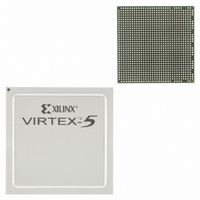XC5VLX50T-2FFG665I Xilinx Inc, XC5VLX50T-2FFG665I Datasheet - Page 105

XC5VLX50T-2FFG665I
Manufacturer Part Number
XC5VLX50T-2FFG665I
Description
IC FPGA VIRTEX-5 50K 665FCBGA
Manufacturer
Xilinx Inc
Series
Virtex™-5 LXTr
Datasheets
1.XC5VLX30-1FFG324C.pdf
(91 pages)
2.XC5VLX30-1FFG324C.pdf
(13 pages)
3.XC5VLX30-1FFG324C.pdf
(385 pages)
Specifications of XC5VLX50T-2FFG665I
Number Of Logic Elements/cells
46080
Number Of Labs/clbs
3600
Total Ram Bits
2211840
Number Of I /o
360
Voltage - Supply
0.95 V ~ 1.05 V
Mounting Type
Surface Mount
Operating Temperature
-40°C ~ 100°C
Package / Case
665-BBGA, FCBGA
For Use With
HW-V5-ML561-UNI-G - EVALUATION PLATFORM VIRTEX-5HW-V5-ML550-UNI-G - EVALUATION PLATFORM VIRTEX-5HW-V5-ML521-UNI-G - EVALUATION PLATFORM VIRTEX-5HW-V5GBE-DK-UNI-G - KIT DEV V5 LXT GIGABIT ETHERNET122-1508 - EVALUATION PLATFORM VIRTEX-5
Lead Free Status / RoHS Status
Lead free / RoHS Compliant
Number Of Gates
-
Available stocks
Company
Part Number
Manufacturer
Quantity
Price
Company:
Part Number:
XC5VLX50T-2FFG665I
Manufacturer:
Xilinx Inc
Quantity:
10 000
- XC5VLX30-1FFG324C PDF datasheet
- XC5VLX30-1FFG324C PDF datasheet #2
- XC5VLX30-1FFG324C PDF datasheet #3
- XC5VLX30T-1FFG665C_PRODUCT_CHANGE PDF datasheet #4
- Current page: 105 of 385
- Download datasheet (14Mb)
PLL Use Models
Virtex-5 FPGA User Guide
UG190 (v5.3) May 17, 2010
Missing Input Clock or Feedback Clock
Clock Network Deskew
When the input clock or feedback clock is lost, the PLL will drive the output clocks to a
lower or higher frequency, causing all of the output clocks to increase/decrease in
frequency. The frequency increase/decrease can cause the clock output frequencies to
change to as much as six times the original configuration.
There are several methods to design with the PLL. The PLL wizard in ISE software can
assist with generating the various PLL parameters. Additionally, the PLL can be manually
instantiated as a component. It is also possible for the PLL to be merge with an IP core. The
IP core would contain and manage the PLL.
One of the predominant uses of the PLL is for clock network deskew.
PLL in this mode. The clock output from one of the O counters is used to drive logic within
the fabric and/or the I/Os. The feedback counter is used to control the exact phase
relationship between the input clock and the output clock (if, for example a 90° phase shift
is required). The associated clock waveforms are shown to the right for the case where the
input clock and output clock need to be phase aligned. This configuration is the most
flexible, but it does require two global clock networks
X-Ref Target - Figure 3-10
There are certain restrictions on implementing the feedback. The CLKFBOUT output can
be used to provide the feedback clock signal. The fundamental restriction is that both input
frequencies to the PFD must be identical. Therefore, the following relationship must be
met:
As an example, if ƒ
frequency are both 498 MHz. Since the M value in the feedback path is 3, both input
frequencies at the PFD are 166 MHz.
In another more complex scenario has an input frequency of 66.66 MHz and D = 2, M = 15,
and O = 2. The VCO frequency in this case is 500 MHz and the O output frequency is
250 MHz. Therefore, the feedback frequency at the PFD is 500/15 or 33.33 MHz, matching
the 66.66MHz/2 input clock frequency at the PFD.
1
IBUFG
2
3
CLKIN1
CLKFBIN
RST
PLL
IN
Figure 3-10: Clock Deskew Using Two BUFGs
is 166 MHz, D = 1, M = 3, and O = 1, then VCO and the clock output
CLKFBOUT
www.xilinx.com
CLKOUT0
CLKOUT1
CLKOUT2
CLKOUT3
CLKOUT4
CLKOUT5
f
------ -
D
IN
=
f
FB
4
6
=
BUFG
BUFG
f
------------ -
VCO
M
5
To Logic
(Figure
3-10).
1
2
3
4
5
6
Figure 3-10
PLL Use Models
Equation 3-8
UG190_3_10_040809
shows the
105
Related parts for XC5VLX50T-2FFG665I
Image
Part Number
Description
Manufacturer
Datasheet
Request
R

Part Number:
Description:
IC FPGA VIRTEX-5 50K 1136FBGA
Manufacturer:
Xilinx Inc
Datasheet:

Part Number:
Description:
IC FPGA VIRTEX-5 50K 665FCBGA
Manufacturer:
Xilinx Inc
Datasheet:

Part Number:
Description:
IC FPGA VIRTEX-5 50K 1136FBGA
Manufacturer:
Xilinx Inc
Datasheet:

Part Number:
Description:
IC FPGA VIRTEX-5 50K 665FCBGA
Manufacturer:
Xilinx Inc
Datasheet:

Part Number:
Description:
IC FPGA VIRTEX-5 50K 1136FBGA
Manufacturer:
Xilinx Inc
Datasheet:

Part Number:
Description:
IC FPGA VIRTEX-5 50K 1136FBGA
Manufacturer:
Xilinx Inc
Datasheet:

Part Number:
Description:
IC FPGA VIRTEX-5 50K 665FCBGA
Manufacturer:
Xilinx Inc
Datasheet:

Part Number:
Description:
IC FPGA VIRTEX-5 50K 665FCBGA
Manufacturer:
Xilinx Inc
Datasheet:

Part Number:
Description:
IC FPGA VIRTEX-5 50K 665FCBGA
Manufacturer:
Xilinx Inc
Datasheet:

Part Number:
Description:
IC FPGA VIRTEX-5 50K 1136FBGA
Manufacturer:
Xilinx Inc
Datasheet:

Part Number:
Description:
IC FPGA VIRTEX-5 50K 1136FBGA
Manufacturer:
Xilinx Inc
Datasheet:

Part Number:
Description:
IC FPGA VIRTEX-5 50K 1136FBGA
Manufacturer:
Xilinx Inc
Datasheet:

Part Number:
Description:
IC FPGA VIRTEX-5 50K 1136FBGA
Manufacturer:
Xilinx Inc
Datasheet:

Part Number:
Description:
FPGA Virtex®-5 Family 46080 Cells 65nm (CMOS) Technology 1V 1136-Pin FCBGA
Manufacturer:
Xilinx Inc
Datasheet:

Part Number:
Description:
FPGA Virtex®-5 Family 46080 Cells 65nm (CMOS) Technology 1V 1136-Pin FCBGA
Manufacturer:
Xilinx Inc
Datasheet:











